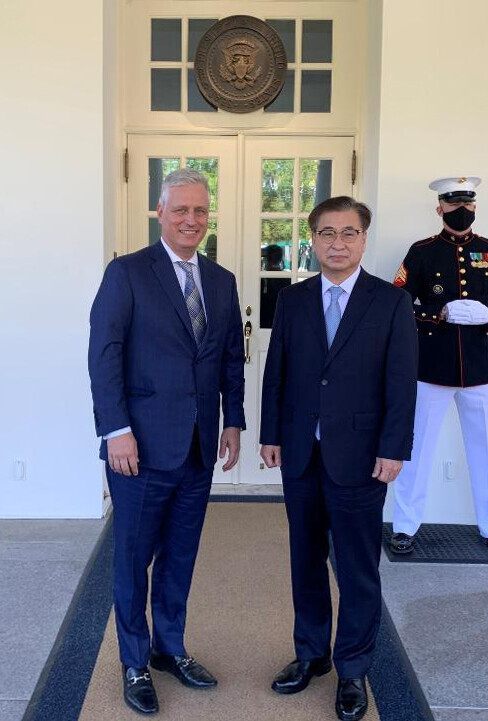hankyoreh
Links to other country sites 다른 나라 사이트 링크
[News analysis] Navigating S. Korea’s security issues amid the US election chaos

National Security Office (NSO) Director Suh Hoon visited Washington, DC, from Oct. 13 to 16 at the invitation of the US government to meet with senior US administration officials and discuss areas of mutual interest, the Blue House announced on Oct. 15.
This marks Suh’s first visit to the US in just over three months since he became the NSO director on July 3, leaving the National Intelligence Service (NIS) director position he had held for just over three years.
Superficially, Suh’s visit takes the form of a formal introduction to White House National Security Advisor Robert O’Brien, which had previously been delayed amid constraints on travel due to the COVID-19 pandemic. On a deeper level, Suh seems to have visited the US to coordinate on alliance issues where the two sides are currently at odds, including the wartime operational control (OPCON) transfer and defense cost-sharing, while managing the Korean Peninsula situation on a stable footing and seeking a diplomatic breakthrough in consideration of the potential transitional confusion surrounding the US presidential election on Nov. 3.
According to Blue House Spokesperson Kang Min-seok, Suh “met with Mr. O’Brien on Oct. 14 and reaffirmed the robust state of the South Korea-US alliance.” Kang also said Suh’s visit would be “an occasion for strengthening strategic communication between our two sides’ national security councils, including discussions on denuclearization and other North Korea-related issues and coordination on major alliance issues, while reaffirming the US government and public’s support for a solid South Korea-US alliance.”
Suh was scheduled to meet with US Secretary of State Mike Pompeo on the afternoon of Oct. 15. Before his departure, he announced his plan to “travel there with an easy mind,” the Blue House reported, indicating that he was not rushing to the US to deal with any urgent issue.
The dates of Suh’s visit also partially coincided with an annual South Korea-US Security Consultative Meeting (SCM) that took place in Washington, DC, on Oct. 13-14. The two sides have shown substantial differences in their stances on the OPCON transfer issue. Seoul hopes for the transfer to go ahead quickly, while the US has been dragging its feet, with Secretary of Defense Mark Esper insisting that “fully meeting all the conditions” will “take time.”
A former South Korean senior official in the area of foreign affairs and national security suggested Suh’s visit “may also be intended as side support for the SCM.” This suggests Suh may have reiterated President Moon Jae-in’s “firm commitment” to an early OPCON transfer in his meeting with O’Brien.
Suh is also expected to share and analyze senior-level South Korea and US intelligence regarding the aims and vision of North Korean leader Kim Jong-un as revealed during a military parade and other events to celebrate the 75th anniversary of the Workers’ Party of Korea (WPK). While the key focus may be on managing the Korean Peninsula situation around the US election and seeking potential avenues toward a breakthrough early next year, discussions are also expected to take place on a possible declaration ending the Korean War, which Moon proposed in speeches before the UN General Assembly and the Korea Society.
Moon called for US cooperation on the end-of-war declaration, which he said would “open the door to complete denuclearization and [a] permanent peace regime on the Korean Peninsula.” He also argued that the alliance would be “even greater when we are actively creating and institutionalizing peace rather than simply deterring war.”
The Blue House further announced that Suh was “scheduled to meet with figures from major think tanks” during his US visit, leading observers to predict that he may interact with figures from Democratic Party candidate Joseph Biden’s camp in addition to President Donald Trump’s as he surveys election trends on the ground.
By Lee Je-hun, senior staff writer, and Seong Yeon-cheol, staff reporter
Please direct comments or questions to [english@hani.co.kr]

Editorial・opinion
![[Editorial] Yoon must halt procurement of SM-3 interceptor missiles [Editorial] Yoon must halt procurement of SM-3 interceptor missiles](https://flexible.img.hani.co.kr/flexible/normal/500/300/imgdb/child/2024/0501/17145495551605_1717145495195344.jpg) [Editorial] Yoon must halt procurement of SM-3 interceptor missiles
[Editorial] Yoon must halt procurement of SM-3 interceptor missiles![[Guest essay] Maybe Korea’s rapid population decline is an opportunity, not a crisis [Guest essay] Maybe Korea’s rapid population decline is an opportunity, not a crisis](https://flexible.img.hani.co.kr/flexible/normal/500/300/imgdb/original/2024/0430/9417144634983596.jpg) [Guest essay] Maybe Korea’s rapid population decline is an opportunity, not a crisis
[Guest essay] Maybe Korea’s rapid population decline is an opportunity, not a crisis- [Column] Can Yoon steer diplomacy with Russia, China back on track?
- [Column] Season 2 of special prosecutor probe may be coming to Korea soon
- [Column] Park Geun-hye déjà vu in Yoon Suk-yeol
- [Editorial] New weight of N. Korea’s nuclear threats makes dialogue all the more urgent
- [Guest essay] The real reason Korea’s new right wants to dub Rhee a founding father
- [Column] ‘Choson’: Is it time we start referring to N. Korea in its own terms?
- [Editorial] Japan’s rewriting of history with Korea has gone too far
- [Column] The president’s questionable capacity for dialogue
Most viewed articles
- 1Months and months of overdue wages are pushing migrant workers in Korea into debt
- 2Trump asks why US would defend Korea, hints at hiking Seoul’s defense cost burden
- 3[Editorial] Yoon must halt procurement of SM-3 interceptor missiles
- 4At heart of West’s handwringing over Chinese ‘overcapacity,’ a battle to lead key future industries
- 5[Guest essay] Maybe Korea’s rapid population decline is an opportunity, not a crisis
- 6Fruitless Yoon-Lee summit inflames partisan tensions in Korea
- 7First meeting between Yoon, Lee in 2 years ends without compromise or agreement
- 8Under conservative chief, Korea’s TRC brands teenage wartime massacre victims as traitors
- 9Dermatology, plastic surgery drove record medical tourism to Korea in 2023
- 10[Column] Park Geun-hye déjà vu in Yoon Suk-yeol